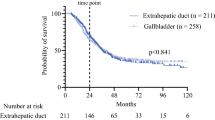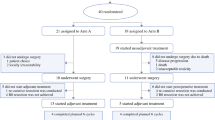Abstract
Purposes
Owing to recent advances in induction chemo(radio)therapy, patients with unresectable locally advanced pancreatic ductal adenocarcinoma (UR-LA PDAC) are sometimes indicated for conversion surgery (CS). However, the predictors for proceeding to CS are unclear. We investigated the predictive factors for CS, especially at the early stage of induction therapy, and evaluated the impact of CS on the survival.
Methods
We analyzed 49 UR-LA PDAC patients retrospectively and investigated the predictive factors for proceeding to CS, including early tumor shrinkage (ETS). ETS in this study was defined as shrinkage of tumors by ≥ 15% at 8–12 weeks after the induction of treatment.
Results
CS was performed in 21 patients (43%). In a multivariate logistic regression analysis, ETS was an independent predictive factor for successfully proceeding to CS (P = 0.046). The median overall survival (OS) was not reached in the CS group but was 17.2 months in the non-CS group (P < 0.0001). A multivariate analysis by the Cox proportional hazard model identified CS as the only significant independent determinant of the OS (hazard ratio: 0.26, 95% confidence interval: 0.07–0.94, P = 0.004).
Conclusions
ETS by induction therapy is a significant predictor of proceeding to CS among patients with UR-LA PDAC. CS was the only independent prognostic factor for this population.


Similar content being viewed by others
References
Bray F, Ferlay J, Soerjomataram I, Siegel RL, Torre LA, Jemal A. Global cancer statistics, 2018. CA Cancer J Clin. 2018;66:394–424.
Heestand GM, Murphy JD, Lowy AM. Approach to patients with pancreatic cancer without detectable metastases. J Clin Oncol. 2015;33:1770–8.
Mukherjee S, Hurt CN, Bridgewater J, Bridgewater J, Falk S, Cummins S, et al. Gemcitabine-based or capecitabine-based chemoradiotherapy for locally advanced pancreatic cancer (SCALOP): a multicentre, randomised, phase 2 trial. Lancet Oncol. 2013;14:317–26.
Hammel P, Huguet F, Van Laethem JL, Goldstein D, Glimelius B, Artru P, et al. Effect of chemoradiotherapy vs chemotherapy on survival in patients with locally advanced pancreatic cancer controlled after 4 months of gemcitabine with or without erlotinib: the LAP07 randomized clinical trial. JAMA. 2016;315:1844–53.
Yamada S, Fujii T, Takami H, Hayashi M, Iwata N, Kanda M, et al. Evaluation and proposal of novel resectability criteria for pancreatic cancer established by the Japan Pancreatic Society. Surgery. 2017;162:784–91.
Conroy T, Desseigne F, Ychou M, Bouche O, Guimbaud R, Becouam Y, et al. FOLFIRINOX versus gemcitabine for metastatic pancreatic cancer. N Engl J Med. 2011;364:1817–25.
Von Hoff DD, Ervin T, Arena FP, Chiorean EG, Infante J, Moore M, et al. Increased survival in pancreatic cancer with nab-paclitaxel plus gemcitabine. N Engl J Med. 2013;369:1691–703.
Yamada S, Fujii T, Yokoyama Y, Kawashima H, Maeda O, Suzuki K, et al. Phase I study of chemoradiotherapy using gemcitabine plus nab-paclitaxel for unresectable locally advanced pancreatic cancer. Cancer Chemother Pharmacol. 2018;81:815–21.
Suker M, Berend BR, Sadot E, Marthey L, Faris JE, Mellon EA, et al. FOLFIRINOX for locally advanced pancreatic cancer: a systematic review and patient-level meta-analysis. Lancet Oncol. 2016;17:801–10.
Rombouts SJ, Walma MS, Vogel JA, van Rijssen LB, Wilmink JW, Mohammad NH, et al. Systematic review of resection and clinical outcomes after FOLFIRINOX-based treatment in patients with locally advanced pancreatic cancer. Ann Surg Oncol. 2016;23:4352–60.
Heinemann V, Stintzing S, Modest DP, Giessen-Jung C, Michl M, Mansmann UR. Early tumour shrinkage (ETS) and depth of response (DpR) in the treatment of patients with metastatic colorectal cancer (mCRC). Eur J Cancer. 2015;51:1927–36.
Cremolini C, Loupakis F, Antoniotti C, Lonardi S, Masi G, Salvatore L, et al. Early tumor shrinkage and depth of response predict long-term outcome in metastatic colorectal cancer patients treated with first-line chemotherapy plus bevacizumab: results from phase III TRIBE trial by the Gruppo Oncologico del Nord Ovest. Ann Oncol. 2015;26:1188–94.
Piessevaux H, Buyse M, Schlichting M, Van Cutsem E, Bokemeyer C, Heeger S, et al. Use of early tumor shrinkage to predict long-term outcome in metastatic colorectal cancer treated with cetuximab. J Clin Oncol. 2013;31:3764–75.
Kaga Y, Sunakawa Y, Kubota Y, Tagawa T, Yamamoto T, Ikusue T, et al. Early tumor shrinkage as a predictor of favorable outcomes in patients with advanced pancreatic cancer treated with FOLFIRINOX. Oncotarget. 2016;7:67314–20.
NCCN Guidelines® and Clinical Resources (2017) Updates to the NCCN Guidelines. https://www.nccn.org/professionals/development.aspx. Accessed 1 Sep 2019
Eisenhauer EA, Therasse P, Bogaerts J, Schwartz LH, Sargent D, Ford R, et al. New response evaluation criteria in solid tumours: revised RECIST guideline (version 1.1). Eur J Cancer. 2009;45:228–47.
Common Terminology Criteria for Adverse Events 4.0. https://evs.nci.nih.gov/ftp1/CTCAE/CTCAE_4.03_2010-06. 1 Sep 2019
Yoshitomi H, Takano S, Furukawa K, Takayashiki T, Kuboki S, Ohtsuka M. Conversion surgery for initially unresectable pancreatic cancer: current status and unresolved issues. Surg Today. 2019. https://doi.org/10.1007/s00595-019-01804-x.
Aldakkak M, Christians KK, Krepline AN, George B, Ritch PS, Erickson BA, et al. Pre-treatment carbohydrate antigen 19–9 does not predict the response to neoadjuvant therapy in patients with localized pancreatic cancer. HPB (Oxford). 2015;17:942–52.
Reni M, Zanon S, Balzano G, Nobile S, Pircher CC, Chiaravalli M, et al. Selecting patients for resection after primary chemotherapy for non-metastatic pancreatic adenocarcinoma. Ann Oncol. 2017;28:2786–92.
Akita H, Takahashi H, Ohigashi H, Tomokuni A, Kobayashi S, Sugimura K, et al. FDG-PET predicts treatment efficacy and surgical outcome of pre-operative chemoradiation therapy for resectable and borderline resectable pancreatic cancer. Eur J Surg Oncol. 2017;43:1061–7.
Malinda I, Terence CC, Jennifer A, Anigel BJ, Christopher BN, Rahel LO, et al. Evaluation of fluorodeoxyglucose positron emission tomography scanning in the neoadjuvant therapy paradigm in pancreatic ductal adenocarcinoma. Pancreas. 2020;49:224–9.
Savio GB, Benjamin L, John AW, Sanjay P. Detecting tumor response and predicting resectability after neoadjuvant therapy for borderline resectable and locally advanced pancreatic cancer. ANJ J Surg. 2019;89:481–7.
Rivera F, Karthaus M, Hecht JR, Sevilla I, Forget F, Fasola G, et al. Final analysis of the randomized PEAK trial: overall survival and tumor responses during first-line treatment with mFOLFOX6 plus either panitumumab or bevacizumab in patients with metastatic colorectal carcinoma. Int J Colorectal Dis. 2017;32:1179–90.
Taieb J, Rivera F, Siena S, Karthaus M, Valladares-Ayerbes M, Gallego J, et al. Exploratory analyses assessing the impact of early tumor shrinkage and depth of response on survival outcomes in patients with RAS wild-type metastatic colorectal cancer receiving treatment in three randomized panitumumab trials. J Cancer Res Clin Oncol. 2018;144:321–35.
Osumi H, Takahari D, Shinozaki E, Chin K, Ogura M, Wakatsuki T, et al. Associations between early tumor shrinkage and depth of response and clinical outcomes in patients treated with 1st-line chemotherapy for advanced gastric cancer. Gastric Cancer. 2018;21:267–75.
Grünwald V, Dietrich M, Pond GR. Early tumor shrinkage is independently associated with improved overall survival among patients with metastatic renal cell carcinoma: a validation study using the COMPARZ cohort. World J Urol. 2018;36:1423–9.
Ueda K, Suekane S, Nishihara K, Suekane H, Ogasawara N, Kurose H, et al. Early primary renal tumor response predicts slinical outcome in patients with primary unresectable renal cell carcinoma with synchronous distant metastasis receiving molecularly targeted therapies. Mol Clin Oncol. 2017;7:205–10.
Kunzmann V, Ramanathan RK, Goldstein D, Liu D, Ferrara S, Lu B, et al. Tumor reduction in primary and metastatic pancreatic cancer lesions with nab-paclitaxel and gemcitabine: an exploratory analysis from a phase 3 study. Pancreas. 2017;46:203–8.
Cassinotto C, Cortade J, Belleannee G, Lapuyade B, Terrebonne E, Vendrely V, et al. An evaluation of the accuracy of CT when determining resectability of pancreatic head adenocarcinoma after neoadjuvant treatment. Eur J Radiol. 2013;82:589–93.
Ferrone CR, Marchegiani G, Hong TS, Ryan DP, Deshpande V, McDonnell EI, Sabbatino F, et al. Radiological and surgical implications of neoadjuvant treatment with FOLFIRINOX for locally advanced and borderline resectable pancreatic cancer. Ann Surg. 2015;261:12–7.
Michelakos T, Pergolini I, Castillo CF, Honselmann KC, Cai L, Deshpande V, Wo JY, et al. Predictors of resectability and survival in patients with borderline and locally advanced pancreatic cancer who underwent neoadjuvant treatment with FOLFIRINOX. Ann Surg. 2019;269:733–40.
Takano N, Yamada S, Hirakawa A, Yokoyama Y, Kawashima H, Maeda O, Okada T, et al. Phase II study of chemoradiotherapy combined with gemcitabine plus nab-paclitaxel for unresectable locally advanced pancreatic ductal adenocarcinoma (NUPAT 05 trial): study protocol for single arm phase II study. Nagoya J Med Sci. 2019;81:233–9.
Acknowledgements
We thank H. Nikki March, PhD, from Edanz Group (www.edanzediting.com/ac) for editing a draft of this manuscript.
Author information
Authors and Affiliations
Corresponding author
Ethics declarations
Conflict of interest
The authors declare no conflicts of interest for this study.
Additional information
Publisher's Note
Springer Nature remains neutral with regard to jurisdictional claims in published maps and institutional affiliations.
Rights and permissions
About this article
Cite this article
Takano, N., Yamada, S., Sonohara, F. et al. The impact of early tumor shrinkage on conversion surgery and the survival in patients with unresectable locally advanced pancreatic cancer. Surg Today 51, 1099–1107 (2021). https://doi.org/10.1007/s00595-020-02220-2
Received:
Accepted:
Published:
Issue Date:
DOI: https://doi.org/10.1007/s00595-020-02220-2




